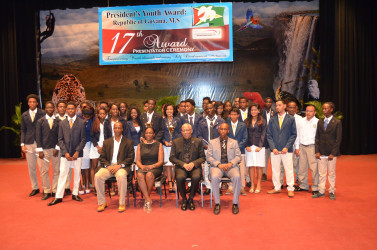President David Granger yesterday sounded a call for a national shift in youth development, which he said must place emphasis on education to ensure that young people are prepared for employment.
Speaking at the 17th awards ceremony for the President’s Youth Award: Republic of Guyana (PYARG) at the National Cultural Centre yesterday, Granger said the shift is crucial for the country’s survival and argued that education is essential in order to provide young people with the knowledge they need to seek and secure jobs. “It is increasingly clear, however, that while we may be graduating thousands of persons every year from various youth development programmes, many have been able to find satisfactory employment. Many remain and slide into unemployment,” he said, while noting that although Guyana suffers from high unemployment and school dropout rates, the primary education dropout rate was at a “staggering height.”
“Education, employment, and entrepreneurship must be emphasised as a critical aspect of youth development,” he added.

Youth schemes, such as the PYARG, Granger noted, must place greater emphasis on education if they are to satisfy the needs of the large youth community and help to secure a better future for participants.
In particular, he said the PYARG must be engineered to ensure that those who graduate with awards are better equipped to create employment, especially self-employment.
He argued that if the programme is to make an effective contribution to youth development, it cannot ignore youth unemployment. Since its inception 17 years ago, he noted, the scheme has emphasised a five-part programme of activities that are valuable and laudable. “…They help to mould character. They may be necessarily qualities for youth development but, given the changes taking place in the world today, they may not be sufficient,” he stated. He pointed out that while Guyana is facing challenges on its borders that it has not been able to resolve in 50 years, and competition from other countries in producing its traditional commodities, it cannot expend scare resources on youth schemes which do not actually benefit the youth. He cited the “so-called President’s Youth Choice Initiative” that was established 15 years ago and charged that it wasted millions of dollars. “What is there to show for the effort?” he questioned.
“The job market is increasingly influenced by technology, especially information technology. Modern communications transmit information at the speed of light around the world and machines are replacing human beings,” Granger pointed out, while stating that the PYARG must expose the youths more intensively to information technology and entrepreneurship to enable graduates to start up their own business and become independent.
A total of 693 participants graduated from the programme yesterday, with 480 receiving the bronze award, 165 receiving the silver award, and 48 receiving the gold award.




